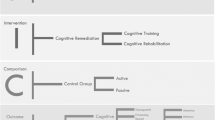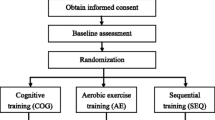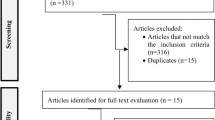Abstract
Background
Cognitive impairment was a common sequela among stroke survivors, and exercise intervention was a promising non-pharmacological treatment modality for it.
Purpose
To explore the effects of exercise intervention programs on cognitive and motor function in patients with cognitive impairment after stroke.
Study design
Systematic review and meta-analysis.
Methods
Seven online databases (PubMed, Embase, Cochrane Library, Web of Science, Scopus, PsycInfo, and SPORTDiscus) were searched from their inception to 10 February 2022. Randomised controlled trials (RCTs) comparing the effects of exercise with non-exercise rehabilitation, using the Montreal Cognitive Assessment, Addenbrooke’s Cognitive Examination, Mini-Mental State Examination, Trial Making Test, Upper and Lower Extremity Fugl-Meyer Assessment, Berg Balance Scale, and Barthel Index, were selected. Calculations for each assessment were performed for the overall effect and the therapy of interest, taking into account the effect of stroke severity or stimulus parameters.
Results
Twelve RCTs involving 975 participants and investigating nine different types of exercise interventions were included. The results were not affected by participant characteristics or reactive balance outcomes. Our results emphasise the importance of lightweight and operable aerobic exercises. Exercise itself had a high potential to improve cognitive impairment and motor function after stroke.
Conclusions
Exercise had significant positive effects on alleviating cognitive and motor impairments after stroke.








Similar content being viewed by others
Data availability
The original contributions presented in the study are included in the article/supplementary material, and further enquiries can be directed to the corresponding author.
Change history
21 February 2023
A Correction to this paper has been published: https://doi.org/10.1007/s10072-023-06691-2
References
Bejot Y et al (2011) Prevalence of early dementia after first-ever stroke: a 24-year population-based study. Stroke 42(3):607–612
Mok VCT et al (2017) Early-onset and delayed-onset poststroke dementia — revisiting the mechanisms. Nat Rev Neurol 13(3):148–159
Lo Coco D, Lopez G, Corrao S (2016) Cognitive impairment and stroke in elderly patients. Vasc Health Risk Manag 12:105–16
Pendlebury ST et al (2015) Methodological factors in determining risk of dementia after transient ischemic attack and stroke: (II) effect of attrition on follow-up. Stroke 46(6):1494–1500
Quinn TJ et al (2021) European stroke organisation and European academy of neurology joint guidelines on post-stroke cognitive impairment. Eur J Neurol 28(12):3883–3920
Bechard LE et al (2020) Physical activity perceptions, experiences, and beliefs of older adults with mild cognitive impairment or Alzheimer’s disease and their care partners. Appl Physiol Nutr Metab 45(11):1216–1224
Wardlaw JM et al (2021) Rates, risks and routes to reduce vascular dementia (R4vad), a UK-wide multicentre prospective observational cohort study of cognition after stroke: Protocol. Eur Stroke J 6(1):89–101
Hutton B et al (2015) The PRISMA extension statement for reporting of systematic reviews incorporating network meta-analyses of health care interventions: checklist and explanations. Ann Intern Med 162(11):777–784
Higgins JP, Altman DG, Gotzsche PC et al (2011) Te Cochrane collaboration’s tool for assessing risk of bias in randomised trials. BMJ 343:d5928
Jia JP, Wang YH, Zhang CD (2011) Chinese guidelines for diagnosis and management of cognitive impairment and dementia (I): dementia diagnostic procedures. Zhonghua Yi Xue Za Zhi 91(9):577–581
Piercy KL et al (2018) The physical activity guidelines for Americans. JAMA 320(19):2020–2028
Zou L et al (2019) The beneficial effects of mind-body exercises for people with mild cognitive impairment: a systematic review with meta-analysis. Arch Phys Med Rehabil 100(8):1556–1573
Khan F et al (2016) An enriched environmental programme during inpatient neuro-rehabilitation: a randomized controlled trial. J Rehabil Med 48(5):417–425
Zheng G et al (2020) Effect of Baduanjin exercise on cognitive function in patients with post-stroke cognitive impairment: a randomized controlled trial. Clin Rehabil 34(8):1028–1039
Ihle-Hansen H et al (2019) A physical activity intervention to prevent cognitive decline after stroke: secondary results from the Life After STroke study, an 18-month randomized controlled trial. J Rehabil Med 51(9):646–651
Kim J, Yim J (2017) Effects of an exercise protocol for improving handgrip strength and walking speed on cognitive function in patients with chronic stroke. Med Sci Monit 23:5402–5409
Nilsson L et al (2001) Walking training of patients with hemiparesis at an early stage after stroke: a comparison of walking training on a treadmill with body weight support and walking training on the ground. Clin Rehabil 15(5):515–527
Ye M et al (2022) Baduanjin exercise ameliorates motor function in patients with post-stroke cognitive impairment: a randomized controlled trial. Complement Ther Clin Pract 46:101506
El-Tamawy MS et al (2014) Aerobic exercises enhance cognitive functions and brain derived neurotrophic factor in ischemic stroke patients. NeuroRehabilitation 34(1):209–213
Moore SA et al (2015) Effects of community exercise therapy on metabolic, brain, physical, and cognitive function following stroke: a randomized controlled pilot trial. Neurorehabil Neural Repair 29(7):623–635
Schachten T, Jansen P (2015) The effects of golf training in patients with stroke: a pilot study. Int Psychogeriatr 27(5):865–873
Cumming TB et al (2018) Early mobilization after stroke is not associated with cognitive outcome findings from AVERT. Stroke 49(9):2147–2154
Fernandez-Gonzalo R et al (2016) Muscle, functional and cognitive adaptations after flywheel resistance training in stroke patients: a pilot randomized controlled trial. J Neuroeng Rehabil 13:37
Studenski S et al (2005) Daily functioning and quality of life in a randomized controlled trial of therapeutic exercise for subacute stroke survivors. Stroke 36(8):1764–1770
Duffy L et al (2013) Reliability (inter-rater agreement) of the Barthel index for assessment of stroke survivors. Stroke 44(2):462–468
Li W et al (2013) Transient focal cerebral ischemia induces long-term cognitive function deficit in an experimental ischemic stroke model. Neurobiol Dis 59:18–25
Pantoni L, Salvadori E (2021) Location of infarcts and post-stroke cognitive impairment. Lancet Neurol 20(6):413–414
Swatridge K et al (2017) The acute effects of aerobic exercise on cognitive control among people with chronic stroke. J Stroke Cerebrovasc Dis 26(12):2742–2748
Lanctôt KL et al (2020) Canadian stroke best practice recommendations: mood, cognition and fatigue following stroke, 6th edition update 2019. Int J Stroke 15(6):668–688
Hasan SM et al (2016) Defining optimal aerobic exercise parameters to affect complex motor and cognitive outcomes after stroke: a systematic review and synthesis. Neural Plast 2016:2961573
Ravichandran H et al (2020) Effects of trunk exercise with physioball to improve trunk balance among subjects with stroke: a systematic review and meta-analysis. J Exerc Rehabil 16(4):313–324
Grande G et al (2014) Physical activity reduces the risk of dementia in mild cognitive impairment subjects: a cohort study. J Alzheimers Dis 39(4):833–839
Szulc-Lerch KU et al (2018) Repairing the brain with physical exercise: cortical thickness and brain volume increases in long-term pediatric brain tumor survivors in response to a structured exercise intervention. Neuroimage Clin 18:972–985
Callisaya M, Nosaka K (2017) Effects of exercise on type 2 diabetes mellitus-related cognitive impairment and dementia. J Alzheimers Dis 59:503–513
Petersen RC et al (2018) Practice guideline update summary: mild cognitive impairment: report of the guideline development, dissemination, and implementation subcommittee of the American Academy of Neurology. Neurology 90(3):126–135
Kiyonaga A et al (2021) Hemisphere-specific parietal contributions to the interplay between working memory and attention. J Cogn Neurosci 33(8):1428–1441
Fischer M, Moscovitch M, Alain C (2021) A systematic review and meta-analysis of memory-guided attention: frontal and parietal activation suggests involvement of fronto-parietal networks. Wiley Interdiscip Rev Cogn Sci 12(1):e1546
Kol A et al (2020) Astrocytes contribute to remote memory formation by modulating hippocampal-cortical communication during learning. Nat Neurosci 23(10):1229–1239
von Bohlen und Halbach O, von Bohlen und Halbach V (2018) BDNF effects on dendritic spine morphology and hippocampal function. Cell Tissue Res 373(3):729–741
Zimmerli L et al (2012) Validation of a mechanism to balance exercise difficulty in robot-assisted upper-extremity rehabilitation after stroke. J Neuroeng Rehabil 9:6
Zou L et al (2018) A review study on the beneficial effects of Baduanjin. J Altern Complement Med 24(4):324–335
Nagamatsu LS et al (2012) Resistance training promotes cognitive and functional brain plasticity in seniors with probable mild cognitive impairment. Arch Intern Med 172(8):666–668
Shiraishi N et al (2017) Effects of a self-exercise program on activities of daily living in patients after acute stroke: a propensity score analysis based on the Japan Association of Rehabilitation Database. Arch Phys Med Rehabil 98(3):434–441
Barha CK et al (2022) Reshaping the path of mild cognitive impairment by refining exercise prescription: a study protocol of a randomized controlled trial to understand the “what,” “for whom,” and “how” of exercise to promote cognitive function. Trials 23(1):766
Richard G et al (2020) Brain age prediction in stroke patients: highly reliable but limited sensitivity to cognitive performance and response to cognitive training. Neuroimage Clin 25:102159
Funding
This work was supported by the budget project of Shanghai University of Traditional Chinese Medicine-Natural Science, Project No. 2021LK014.
Author information
Authors and Affiliations
Contributions
Wenxuan Li: investigation, data curation, formal analysis, and writing of the original draft; Ziyan Luo: investigation, data curation, and formal analysis; Jieting Jiang: formal analysis and data curation; Kunpeng Li: conceptualisation, methodology, data curation, writing, review, and editing; Caiqin Wu: conceptualisation, methodology, data curation, writing, review, editing, and supervision. All the authors agree to be accountable for all aspects of this work.
Corresponding authors
Ethics declarations
Conflict of interest
The authors declare no competing interests.
Ethical approval
There are no human subjects in this article.
Informed consent
Not applicable.
Additional information
Publisher's note
Springer Nature remains neutral with regard to jurisdictional claims in published maps and institutional affiliations.
The original online version of this article was revised: The article was originally published with error. The old version of figures 4, 6 and 8 were used during processing and the level of some headings was not correctly identified.
Rights and permissions
Springer Nature or its licensor (e.g. a society or other partner) holds exclusive rights to this article under a publishing agreement with the author(s) or other rightsholder(s); author self-archiving of the accepted manuscript version of this article is solely governed by the terms of such publishing agreement and applicable law.
About this article
Cite this article
Li, W., Luo, Z., Jiang, J. et al. The effects of exercise intervention on cognition and motor function in stroke survivors: a systematic review and meta-analysis. Neurol Sci 44, 1891–1903 (2023). https://doi.org/10.1007/s10072-023-06636-9
Received:
Accepted:
Published:
Issue Date:
DOI: https://doi.org/10.1007/s10072-023-06636-9




